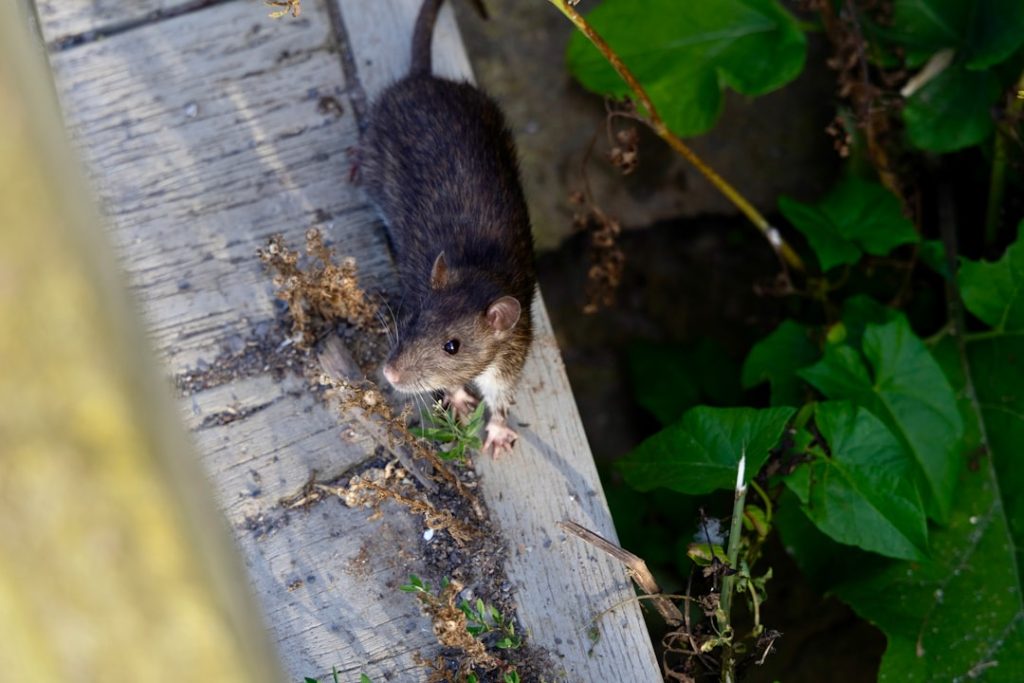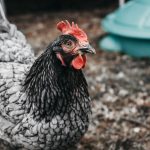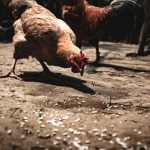Rats pose significant threats to chickens and their coops due to several factors. These rodents are known carriers of various diseases that can be transmitted to chickens, potentially causing illness or death within the flock. Rats are also predatory and may attack and kill chickens, particularly young or vulnerable birds, resulting in livestock losses for owners.
Additionally, rats’ ability to gnaw through various materials, including wood, plastic, and metal, can cause extensive damage to coops, compromising their structural integrity and potentially allowing access to other predators. The combination of disease transmission, predation, and structural damage makes rat infestations a serious concern for chicken owners, necessitating proactive measures to prevent and control these pests in and around chicken coops.
Table of Contents
- 1 Creating a rat-proof coop: Tips for securing your chicken enclosure
- 2 Removing attractants: How to eliminate food and water sources for rats
- 3 Natural deterrents: Using plants and predators to keep rats at bay
- 4 Trapping and removal: Effective methods for catching and relocating rats
- 5 Maintaining cleanliness: The importance of regular coop maintenance in rat prevention
- 6 Seeking professional help: When to call in pest control experts for rat infestations
- 7 FAQs
- 7.1 What are the risks of having rats near chickens?
- 7.2 How can I keep rats away from my chickens?
- 7.3 What are some natural ways to deter rats from the chicken coop?
- 7.4 Are there any commercial products that can help keep rats away from chickens?
- 7.5 What should I do if I suspect a rat infestation near my chickens?
Key Takeaways
- Rats pose a danger to chickens by preying on eggs and young chicks, spreading diseases, and causing structural damage to coops.
- Secure chicken enclosures by using hardware cloth, burying wire mesh, and sealing any gaps or openings to prevent rats from entering.
- Eliminate food and water sources for rats by storing chicken feed in secure containers, cleaning up spilled feed, and fixing any leaks or standing water.
- Use natural deterrents such as mint, lavender, and predator animals like cats or terriers to discourage rats from entering the coop area.
- Effective methods for catching and relocating rats include snap traps, live traps, and electronic traps, followed by releasing them far away from the coop.
- Regular coop maintenance, including cleaning up spilled feed, removing debris, and keeping the area tidy, is crucial in preventing rat infestations.
- Call in pest control experts for rat infestations if DIY methods are ineffective, or if the infestation is severe and requires professional intervention.
Creating a rat-proof coop: Tips for securing your chicken enclosure
Constructing a Rat-Proof Coop
One effective method is to ensure that the coop is constructed with sturdy materials that rats cannot easily chew through. Using hardware cloth with small mesh sizes on windows and vents can prevent rats from gaining entry into the coop.
Sealing Gaps and Cracks
Additionally, sealing any gaps or cracks in the coop’s structure with durable materials such as metal or concrete can help keep rats out. It is also important to elevate the coop off the ground and install barriers such as concrete or hardware cloth around the base to prevent rats from burrowing underneath.
Maintenance and Hygiene
Furthermore, keeping the coop clean and free of food scraps can help deter rats from taking up residence in the area.
Protecting Your Flock
By implementing these measures, chicken owners can significantly reduce the risk of rat infestations and protect their flock from harm.
Removing attractants: How to eliminate food and water sources for rats
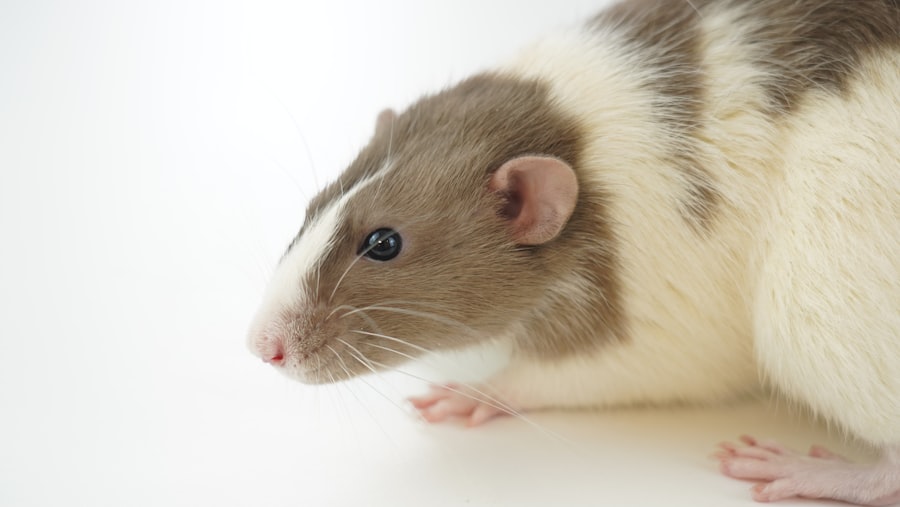
Rats are attracted to areas where food and water are readily available, making it essential for chicken owners to eliminate these attractants in order to deter rats from infesting their coops. One way to achieve this is by ensuring that chicken feed is stored in secure containers that rats cannot access. Additionally, cleaning up any spilled feed promptly can help reduce the likelihood of attracting rats to the area.
It is also important to address any water sources that may be attracting rats, such as leaky faucets or standing water. By fixing these issues and keeping the area around the coop clean and free of debris, chicken owners can significantly reduce the risk of rat infestations and create a safer environment for their flock. Rats are attracted to areas where food and water are readily available, making it essential for chicken owners to eliminate these attractants in order to deter rats from infesting their coops.
One way to achieve this is by ensuring that chicken feed is stored in secure containers that rats cannot access. Additionally, cleaning up any spilled feed promptly can help reduce the likelihood of attracting rats to the area. It is also important to address any water sources that may be attracting rats, such as leaky faucets or standing water.
By fixing these issues and keeping the area around the coop clean and free of debris, chicken owners can significantly reduce the risk of rat infestations and create a safer environment for their flock.
Natural deterrents: Using plants and predators to keep rats at bay
In addition to securing the coop and removing attractants, chicken owners can also utilize natural deterrents to keep rats at bay. Planting mint, lavender, or other strong-smelling herbs around the coop can help repel rats due to their dislike of these scents. Additionally, introducing natural predators such as cats or terriers to the area can help keep rat populations in check.
These animals are known for their hunting instincts and can help deter rats from infesting the coop. By incorporating these natural deterrents into their pest control strategy, chicken owners can create a more inhospitable environment for rats and reduce the risk of infestations. In addition to securing the coop and removing attractants, chicken owners can also utilize natural deterrents to keep rats at bay.
Planting mint, lavender, or other strong-smelling herbs around the coop can help repel rats due to their dislike of these scents. Additionally, introducing natural predators such as cats or terriers to the area can help keep rat populations in check. These animals are known for their hunting instincts and can help deter rats from infesting the coop.
By incorporating these natural deterrents into their pest control strategy, chicken owners can create a more inhospitable environment for rats and reduce the risk of infestations.
Trapping and removal: Effective methods for catching and relocating rats
When faced with a rat infestation, it is important for chicken owners to take swift action to trap and remove these pests from their property. One effective method is to use snap traps baited with peanut butter or other enticing foods to catch rats. These traps should be strategically placed in areas where rat activity has been observed, such as near feed storage areas or along walls and fences.
Once trapped, rats should be humanely removed from the property and relocated to a more suitable habitat away from the coop. It is important for chicken owners to regularly check and reset traps as needed in order to effectively control rat populations and protect their flock. When faced with a rat infestation, it is important for chicken owners to take swift action to trap and remove these pests from their property.
One effective method is to use snap traps baited with peanut butter or other enticing foods to catch rats. These traps should be strategically placed in areas where rat activity has been observed, such as near feed storage areas or along walls and fences. Once trapped, rats should be humanely removed from the property and relocated to a more suitable habitat away from the coop.
It is important for chicken owners to regularly check and reset traps as needed in order to effectively control rat populations and protect their flock.
Maintaining cleanliness: The importance of regular coop maintenance in rat prevention
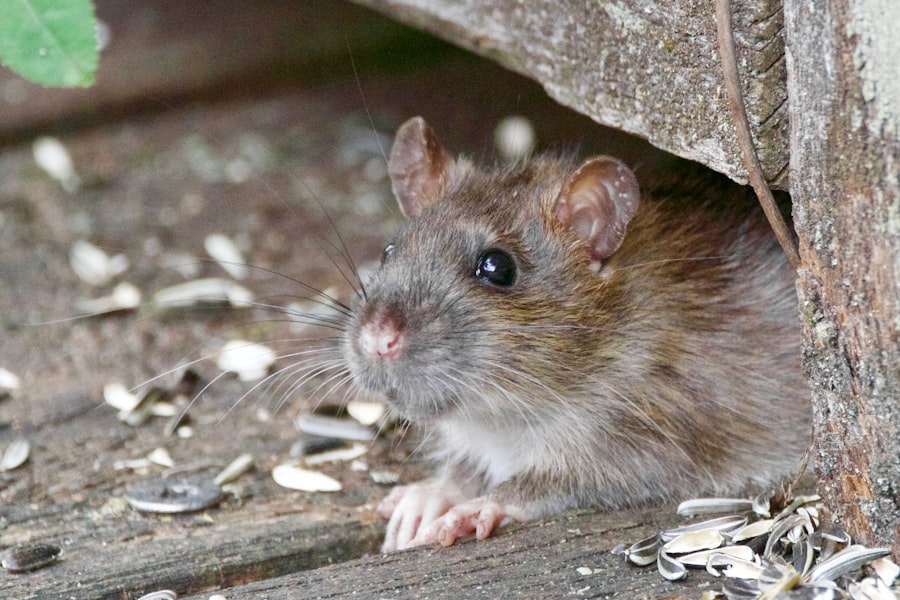
Keep the Coop Clean
Keeping the coop clean and free of debris is essential for preventing rat infestations. This includes removing any spilled feed or nesting materials that could attract rats.
Inspect the Coop Regularly
Regularly inspecting the coop for any signs of damage or wear and tear can help identify potential entry points for rats and allow for prompt repairs. This can include checking for holes, gaps, or weak points in the coop’s walls, floor, or roof.
Create a Rat-Free Environment
By staying on top of regular maintenance tasks, chicken owners can create a less hospitable environment for rats and reduce the risk of infestations. This can include taking steps to eliminate food sources, removing clutter, and keeping the surrounding area clean and tidy.
Seeking professional help: When to call in pest control experts for rat infestations
In some cases, rat infestations may become too severe for chicken owners to handle on their own, necessitating the need for professional pest control assistance. If efforts to trap and remove rats have been unsuccessful or if there is evidence of a large-scale infestation, it may be time to call in experts who specialize in rodent control. These professionals have the knowledge, experience, and resources necessary to effectively address rat infestations and prevent future occurrences.
By seeking professional help when needed, chicken owners can ensure the health and safety of their flock while also protecting their property from extensive damage caused by rats. In some cases, rat infestations may become too severe for chicken owners to handle on their own, necessitating the need for professional pest control assistance. If efforts to trap and remove rats have been unsuccessful or if there is evidence of a large-scale infestation, it may be time to call in experts who specialize in rodent control.
These professionals have the knowledge, experience, and resources necessary to effectively address rat infestations and prevent future occurrences. By seeking professional help when needed, chicken owners can ensure the health and safety of their flock while also protecting their property from extensive damage caused by rats.
If you’re looking for ways to keep rats away from your chickens, you may want to consider building a garden chicken coop. This type of coop is designed to blend in with your garden and can help deter rats from getting too close to your chickens. For more information on building a garden chicken coop, check out this helpful article on PoultryWizard.
FAQs
What are the risks of having rats near chickens?
Rats can pose a threat to chickens by stealing their eggs, eating their feed, and even attacking young chicks. Additionally, rats can spread diseases to both chickens and humans.
How can I keep rats away from my chickens?
To keep rats away from chickens, it’s important to keep the chicken coop and surrounding areas clean and free of food sources. This includes securing feed in rodent-proof containers, removing any spilled feed, and regularly cleaning up any food scraps.
What are some natural ways to deter rats from the chicken coop?
Some natural ways to deter rats from the chicken coop include using peppermint oil, planting mint around the coop, and using predator urine or hair from predators like cats or dogs to create a deterrent scent.
Are there any commercial products that can help keep rats away from chickens?
Yes, there are commercial products such as rodent-proof feeders, traps, and electronic deterrent devices that can help keep rats away from chickens. It’s important to follow the instructions carefully and use these products safely around the chickens.
What should I do if I suspect a rat infestation near my chickens?
If you suspect a rat infestation near your chickens, it’s important to take action immediately. This may include setting traps, sealing off entry points to the coop, and possibly seeking professional pest control assistance if the infestation is severe.
Meet Walter, the feathered-friend fanatic of Florida! Nestled in the sunshine state, Walter struts through life with his feathered companions, clucking his way to happiness. With a coop that’s fancier than a five-star hotel, he’s the Don Juan of the chicken world. When he’s not teaching his hens to do the cha-cha, you’ll find him in a heated debate with his prized rooster, Sir Clucks-a-Lot. Walter’s poultry passion is no yolk; he’s the sunny-side-up guy you never knew you needed in your flock of friends!

